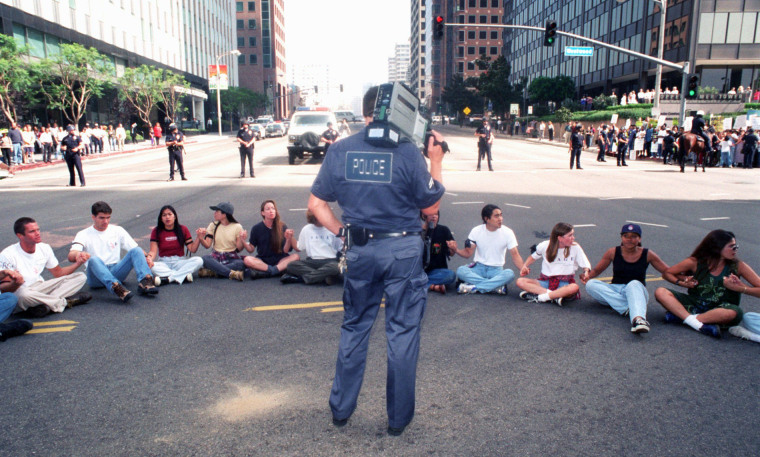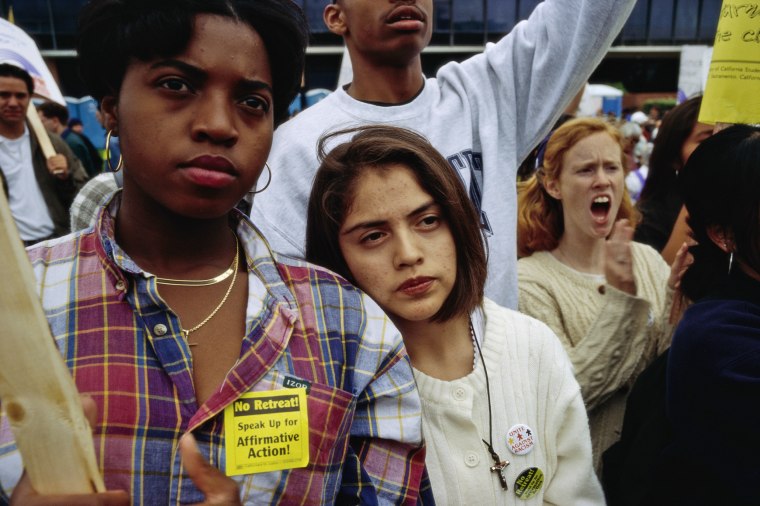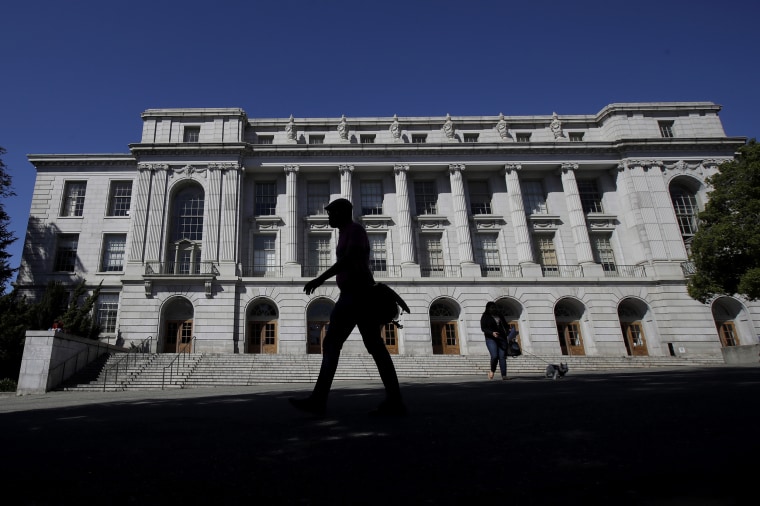More than two decades after affirmative action was banned in California, voters will decide whether to restore the practice with a ballot measure supporters say would bring greater access to educational and job opportunities but that detractors warn would reintroduce discrimination.
If passed, Proposition 16 would repeal a 1996 measure that banned the consideration of race and sex in the public sector, including admissions to one of the country’s largest university systems.
Supporters of Proposition 16 include a who’s who of California heavy hitters: Sen. Kamala Harris, Gov. Gavin Newsom, the University of California Board of Regents, several major newspapers and dozens of state and local elected leaders.
Proponents argue that California’s public sector should mirror its diverse population and that affirmative action can help admissions teams and hiring managers weigh a candidate’s complete profile, including how race and gender might have shaped their experiences and opportunities.

“We need to correct a wrong,” said Monica Lazo, a statewide political organizer who is helping to lead the Yes on Prop. 16 outreach effort. “We need to get California back on the right side of history — 2020 is the time.”
But opponents liken the ballot measure to a Band-Aid. They say it would not root out the larger problem of systemic racism and instead create more inequities by excluding overrepresented groups from hiring and admissions practices and elevating underqualified candidates to positions they are not prepared to tackle.
“Logically if one population increases, then the other has to decrease,” said Bethany Huang, a first-year student at the University of California, Irvine. “It feels like Asian American struggles are often overlooked. This only furthers that problem.”
Both positions are deeply rooted in the bigger issue of racial reckoning confronting the U.S., which has led to social unrest and calls to dismantle systemic racism.
Proposition 209, which Proposition 16 seeks to repeal, was passed in 1996 under Republican Gov. Pete Wilson. It was part of a larger, anti-immigration wave overtaking California at the time, which included a voter-approved law that would have denied health care, education and other services to people living in the U.S. without authorization. That law was eventually overturned in federal court.
When Proposition 209 initially passed, Wilson, who recently endorsed President Donald Trump for re-election, said the measure “sought to undo a terrible unfairness so that opportunity is offered not just to some Californians, but to all Californians,” the Los Angeles Times reported in 1996.
More than 20 years later, a new generation of voters and elected leaders say repealing the measure would correct years of missed opportunities for people who don’t have access to education and job training.

Nicole Anyanwu, a senior at the University of California, Berkeley, studying molecular environmental biology, said she immediately noticed being one of the few Black students on campus.
“It definitely had an impact on my experience navigating the university,” she said. “I knew about Berkeley being well-known in the realm of academia, but one thing I didn’t know is that it was lacking in diversity and especially diversity in STEM.”
In California, Black people comprise about 7 percent of the population but just 3 percent of undergraduate students at UC Berkeley. Across the UC system, 4 percent of all students enrolled in 2019 were Black.
For Latino students, the gap is even larger. Latinos made up 22 percent of students enrolled in the UC system last year but 40 percent of the total state population. Meanwhile, Asian students are overrepresented across UC’s 10 campuses. They comprised 30 percent of the student population and 16 percent of California’s population.
Huang, a political science major who is running for a seat on the Irvine Board of Education, worries that Asian students like herself could face discrimination if Proposition 16 passes.
“I think that’s not a great consequence,” she said. “It’s not fair to Asian American students to decrease their numbers in the UC system. They’re also people of color.”
Since the coronavirus pandemic spread across the globe, Huang said she and her Asian American friends in Southern California have endured racist comments and side glances. She blames the rhetoric coming out of the White House and said she doesn’t feel the same kind of support and camaraderie shared by people supporting racial justice movements.
Instead, Huang worries about being further stigmatized for being a high-achieving student.
“A lot of people will use Asian Americans to further divide people of color,” she said. “We are often isolated from people of color because we are seen as supposedly more successful or stereotypically smarter, which is not true. There are many Asian Americans who are struggling.”
The question of racial bias is central to recent lawsuits accusing Harvard and Yale universities of intentionally discriminating against Asian American students who apply to the Ivy League schools. Both lawsuits were backed by the U.S. Department of Justice and both schools denied discriminating against any group during the admissions process.
Vivrd Prasanna, a first-year student at UC Berkeley who plans to vote against Proposition 16, said an unintended consequence of Proposition 16 could be to further fuel racial stereotypes. There is an assumption, he said, that people of color are all low-income while all white people are affluent.
“We know that’s not true,” he said.
But for people who remember the passage of Proposition 209 in 1996, the racial overtones of rejecting affirmative action cannot be overlooked.
State Assemblymember Miguel Santiago, a Democrat representing portions of East Los Angeles, was still in college when the measure passed, creating a pivotal moment in his political awakening that inspired him to eventually seek elected office to try to undo some of the state’s most controversial policies.
Two decades later, “we’re still fighting the same fight,” he said. “You have to give us a shot at education. You just have to.”
Santiago grew up in the largely blue-collar Latino neighborhood he now represents. His parents were deported several times, and finishing high school was a struggle for the young student who had to work while attending classes. His grades weren’t the best and his SAT scores weren’t the highest, but he eventually attended the University of California, Los Angeles, and graduated magna cum laude.
“We know today that situation is very similar among many young people,” he said. “They’re hardworking. They’re incredibly intelligent. They just have not had that opportunity.”

